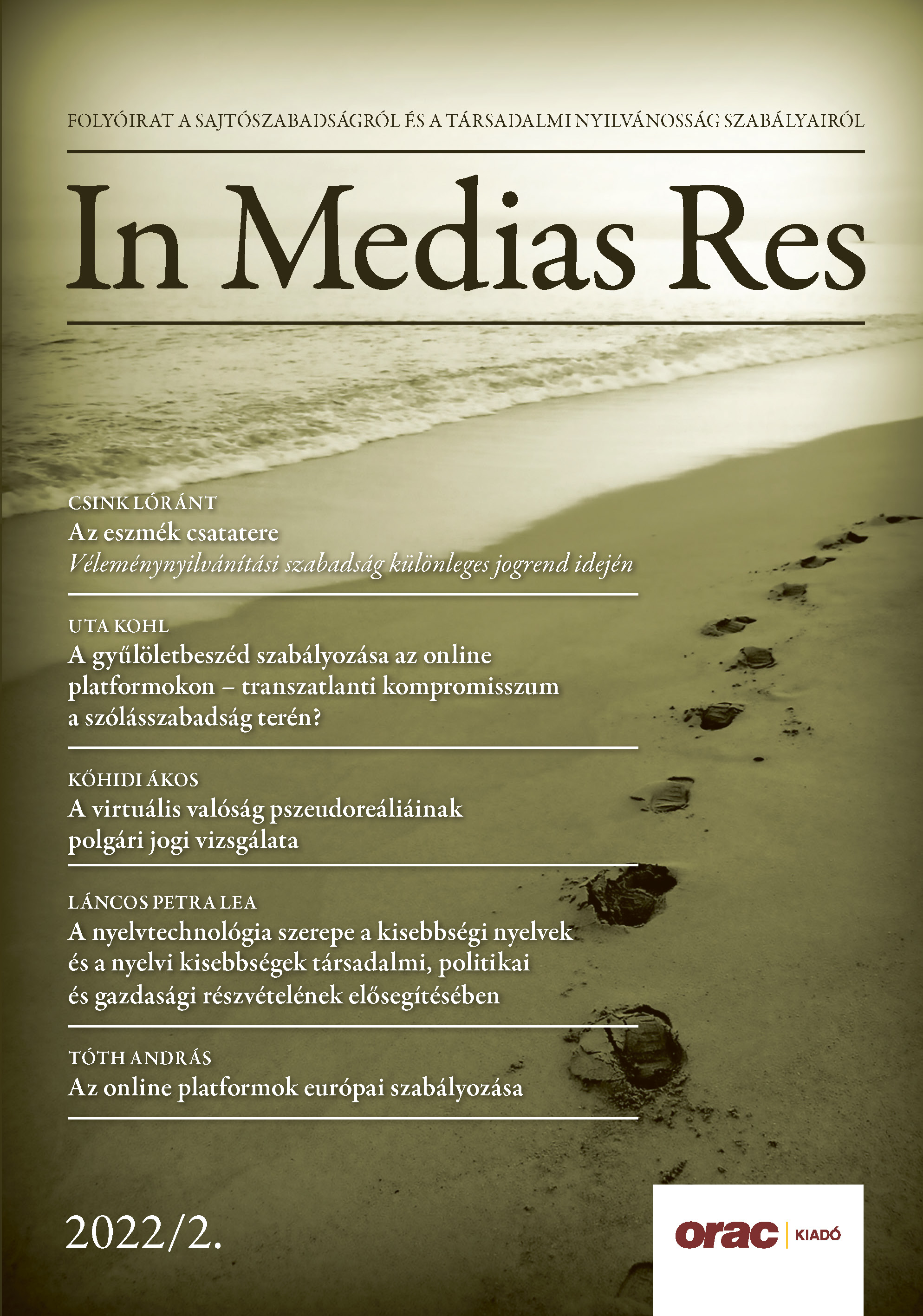Battlefield of Ideas
Freedom of Expression under State of Emergency
DOI:
https://doi.org/10.59851/imr.11.2.2Keywords:
freedom of expression, state of emergency, restriction of fundamental rightsAbstract
For a long time, we expected state of emergency to be a purely theoretical possibility. Security policy experts and theoretical constitutional lawyers have modeled what measures can be introduced at the time of state of emergency and how they affect our fundamental rights. We hardly thought of introducing them permanently and significantly until the spring of 2020. Since then, the pandemic, and today the war in our neighbourhood, has shown that state of emergency is real and imminent, and there is a greater restriction of our fundamental rights than ever before. The question arises: how can freedom of expression be exercised under such circumstances? The problem can be raised at both the individual and community level. At the individual level, it is possible to ask why and to what extent we should give up free speech and whether the restriction is legitimate at all. Besides, the events in Ukraine have confirmed that the outcome of the war is decided not only on the battlefields but also on the communication front: the opposing forces want to emphasise their own communication, in a fashionable word: to strengthen their narrative. In such a situation, the question arises sharply in each state: is the silence of war propaganda or its free spread better for democracy?
References
Ádám Antal:A tömegközlés alkotmányi szabadsága. Acta Humana, 30. (1998) 10.
Csink Lóránt: Családmodellek, gyűlöletbeszéd és véleményszabadság. A tolerancia 50 árnyalata. In Székely László (szerk.): "Ha majd a jognak asztalánál / Mind egyaránt foglal helyet..." Tanulmányok az ENSZ Emberi Jogok Egyetemes Nyilatkozata aláírásának 70. évfordulója tiszteletére. Budapest, Alapvető Jogok Biztosának Hivatala, 2018, 13.
Csink Lóránt: Véleménynyilvánítás szabadsága. In Csink Lóránt (szerk.): Alapjogi kommentár az alkotmánybírósági gyakorlat alapján. Budapest, Novissima, 2021, 94.
Domonkos Andrea: Egyes, a járványhoz kapcsolódó büntetőjogi szabályok különleges jogrend idején. Glossa Iuridica, 2020. különszám, 80.
Drinóczi Andrea: Az Alkotmánybíróság határozata a különleges jogrend idején megvalósuló rémhírterjesztésről. Jogesetek Magyarázata, 2021/1., 9.
Jakab András - Fekete Balázs: Internetes Jogtudományi Enciklopédia (Alkotmányjog rovat, rovatszerkesztő: Bodnár Eszter - Jakab András) https://bit.ly/3fQdGi7 (2018) [4]-[5].
Koltay András: A rémhírterjesztés büntethetőségének alkotmányosságáról. In Medias Res, 2020/2., 338.
Koltay András: A véleménynyilvánítás szabadsága. In Jakab András - Fekete Balázs (szerk.): Internetes Jogtudományi Enciklopédia (Alkotmányjog rovat, rovatszerkesztő: Bodnár Eszter - Jakab András) https://bit.ly/3fQdGi7 (2018) [4]-[5].
Klein Tamás: Rémhírterjesztés egykor és ma. In Rixer Ádám (szerk.): A járvány hosszú távú hatása a magyar közigazgatásra. Budapest, KRE ÁJK, 2021, 112.
Peter Smuk: The constitutional guarantees of democratic political discourses and their regulation in Central Europe. In András Koltay (szerk.): Comparative Perspectives on the Fundamental Freedom of Expression. Budapest, Wolters Kluver, 2015, 89.
Szajbély Katalin: Összeegyeztethető-e a gyűlöletbeszéd a véleménynyilvánítás alkotmányos alapjogával Magyarországon? In Trócsányi László (szerk.): Dikaiosz logosz. Szeged, Pólay Elemér Alapítvány, 2012, 131.
Till Szabolcs: Az Alkotmánybíróság döntése a közérdekű adatigénylések eljárási határidejéről. Jogesetek Magyarázata, 2021/4., 7.
Till Szabolcs: Különleges jogrend 2020-2023. Budapest, Magyar Katonai Jogi és Hadijogi Társaság, 2022, 82-84. (megjelenés alatt).
Török Bernát: Szabadon szólni, demokráciában. Budapest, HVG-ORAC, 2018, 101.
Török Bernát: A gyűlöletbeszéd tilalmának médiajogi mércéi. Jogtudományi Közlöny, 2013/2., 69.
Török Bernát A közlések alkotmányos alapértéke a szólásszabadság magyar koncepciójában. Mit fed le a véleménynyilvánításhoz való jog hatálya? In Koltay András - Török Bernát (szerk.): Sajtószabadság és médiajog a 21. század elején, 2. Budapest, CompLex, 2015, 206.
Downloads
Published
How to Cite
Issue
Section
License
Copyright (c) 2022 Lóránt Csink

This work is licensed under a Creative Commons Attribution 4.0 International License.


